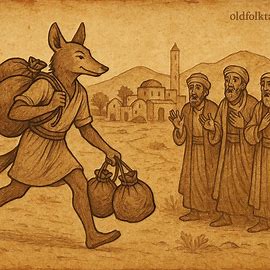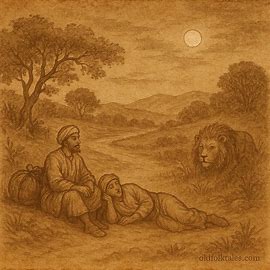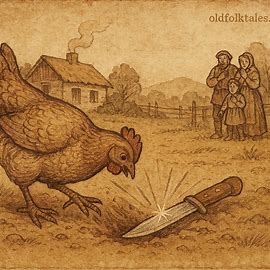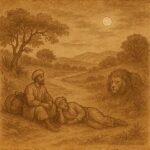Long ago, in the highlands of Eritrea, where the Tigrean people shared their wisdom through tales told by firelight, there lived a scholar who loved his books. He often withdrew to a quiet place, far from the noise of the village, where he could read, write, and reflect. The scholar carried with him a sharp knife, not for defense, but for his learning. Each time he made a mistake in his writing, he would scratch it out carefully with the knife’s edge, then continue his work with steady hand and patient heart.
Unseen by him, a guenon, one of those clever monkeys known for their mischief and mimicry, watched from a nearby perch. The guenon’s curious eyes followed every movement of the scholar: the dipping of the pen, the scratching of errors, the frowning concentration that deepened on the scholar’s brow. Fascinated, the guenon longed to imitate the man, to copy his gestures and prove himself just as wise.
The scholar, unaware of his observer, worked on for some time until a small matter called him away. He rose, set down his pen and knife, and stepped aside. No sooner had the scholar gone than the guenon scrambled down from his place. His nimble fingers reached for the pen, his eager hands seized the paper.
But writing is not so simple for one who has never studied. Where the scholar’s hand was measured and deliberate, the guenon’s was clumsy and untrained. Instead of letters, he smeared the page with blotches of ink. Where the scholar had written lines of thought, the guenon left only chaos. What had been neat and orderly was now spoiled with stains and smudges.
When the scholar returned, he saw the ruin of his work. His heart sank, and sorrow filled his chest. Yet he did not grow angry. Instead, he looked at the guenon and spoke with calm resolve:
“If you wish to do as I do, then you must do it completely.”
READ THIS: Fox, Kite, and Raven: A Tigrean Folktale That Teaches Lessons on Courage and Deception
The guenon, tilting his head, seemed to understand. The scholar then lifted the knife, whetted it against a stone until the edge was keen and sharp. With deliberate care, he placed the blunt back of the knife against his own throat and rubbed it gently, as though demonstrating some ritual of learning. Then he slid the knife back into its sheath, set it aside, and departed once more.
The guenon, dazzled by what he had seen, could not resist repeating the act. He snatched the knife, holding it with awkward but determined hands. Unlike the scholar, he did not press the blunt side to his throat, he pressed the sharp edge. With one swift motion, he cut himself deeply. The mimicry that began in pride ended in tragedy. The guenon fell lifeless to the ground, destroyed by his own blind imitation.
And so it is said among the Tigrean people: wisdom cannot be gained by copying alone, nor knowledge by imitation without understanding.
Moral Lesson
This Tigrean folktale warns against the dangers of blind imitation. The guenon sought to appear wise by copying the scholar’s actions, yet lacked the knowledge to discern meaning from gesture. True learning comes not from mimicry but from understanding. Wisdom requires patience, practice, and reflection, qualities the scholar possessed, but the guenon did not.
The tale reminds us that appearances deceive: what seems simple may conceal great skill, and what seems harmless may hide danger. To imitate without comprehension is to walk a path toward ruin. Like the guenon, those who follow blindly risk falling to destruction, while those who seek true knowledge find the strength to endure.
Knowledge Check
Who was being observed at the start of the tale?
A scholar, writing and correcting his work in solitude.
What tool did the scholar use to correct his mistakes?
A knife, which he used to scratch out errors on the page.
Why did the guenon smear the scholar’s writing?
Because he tried to imitate the scholar’s writing but lacked the skill to do it properly.
How did the scholar trick the guenon into revealing his ignorance?
He rubbed the blunt side of the knife against his throat, pretending it was dangerous.
What was the guenon’s fatal mistake?
He imitated the act with the sharp edge of the knife, cutting his throat.
Where does this folktale originate?
It is a Tigrean folktale from Eritrea.
Source: Tigrean folktale, Eritrea.






